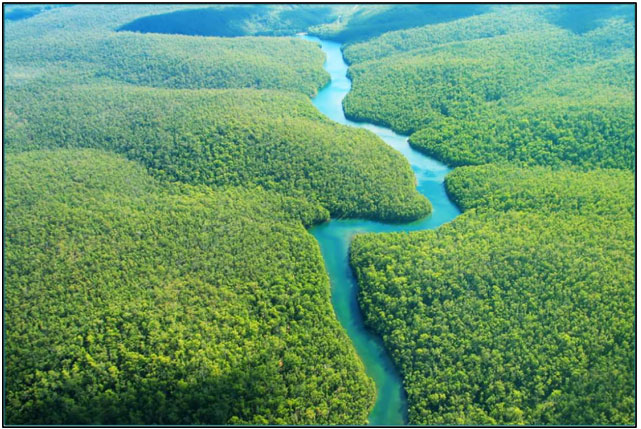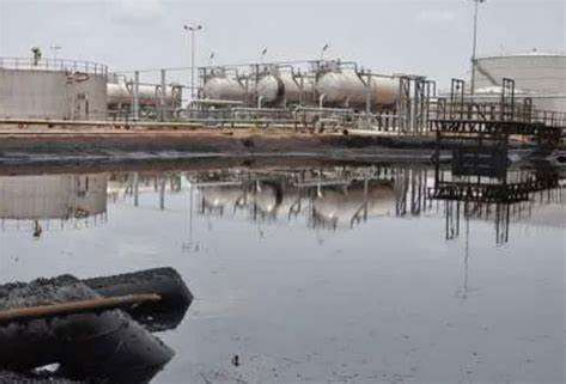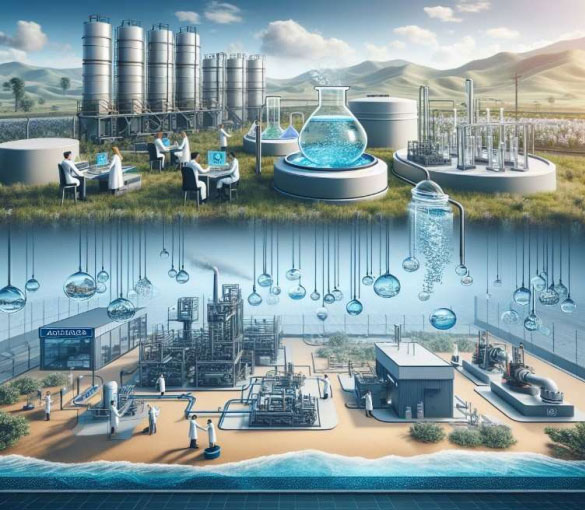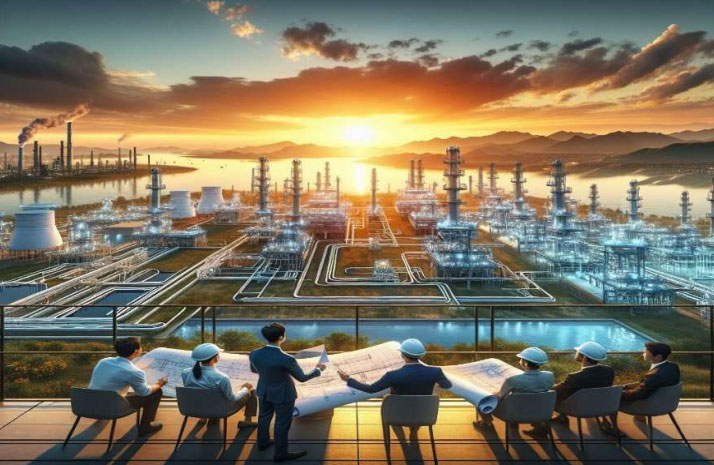Water management is an integral process of planning, developing, distributing and managing the optimal use of water resources. It is essential to strengthen these processes to guarantee the availability and accessibility of water for all uses where it is needed, including human consumption, agriculture, industry and the preservation of natural ecosystems. EƯective water management goes hand in hand with implementing policies and practices that promote the sustainable and fair use of this vital resource.
In the global context, water management is critical due to growing challenges such as climate change, accelerated urbanization, and ever-increasing water demand. These factors lead to greater water scarcity and pollution, aƯecting human communities and so ecosystems. International collaboration and technological innovation, based on real-world experiences, are essential to address these challenges and ensure a safe and sustainable water supply for future generations.
In Colombia, water management has been strengthened through robust environmental regulations, such as Law 99 of 19931 and Decree 3930 of 20102, which set up essential parameters for the use and conservation of water resources. In addition, the country’s commitment to the preservation of vital ecosystems, such as the Amazon, is crucial, given that the Colombian Amazon, known as the lungs of the planet, stands for a pillar for the regulation of the global climate and the Sconservation of biodiversity.

ecosystem. Link Here
- Congress of Colombia. (1993). Law 99 of 1993, which creates the Ministry of the Environment, reorganizes the public sector in charge of the management and conservation of the environment and renewable natural resources, organizes the National Environmental System (SINA) and dictates other provisions. OƯicial Gazette No. 41.146. Link here
- Presidency of the Republic of Colombia. (2010). Decree 3930 of 2010, which regulates the use, management and conservation of water resources and dictates other provisions. OƯicial Gazette No. 47.937. Link Here
Principles of Integrated Water Management. 1888 Industrial Services is an innovative company that has recently expanded its engineering area, incorporating a team of specialists with more than 20 years of experience in the design, construction, installation and commissioning of equipment, plants and facilities for the treatment of water associated with the extraction of hydrocarbons in Colombia. This multidisciplinary team is composed of experts in various areas of engineering, which allows them to comprehensively address the complex challenges of the Oil & Gas sector.
The company stands out for its commitment to sustainability and technological innovation, implementing advanced solutions that not only improve water use, but also minimize the environmental impact of hydrocarbon extraction operations. With a strong knowledge base and vast practical experience, 1888 Industrial Services is positioned to lead large-scale projects, contributing significantly to the eƯicient and sustainable management of water in the industry.
1888 Industrial Services plans to adopt and apply the principles of Integrated Water Management (IWRM) to optimize the use and conservation of water resources, especially in its areas of direct influence such as the state of Colorado, New Mexico and Texas, where the demand for water exceeds the available supply due to drought and climate change. These principles include social equity, ensuring equal access to water for all communities; economic eƯiciency, maximizing the benefits of using water to meet the needs of industry and society; and cological sustainability, protecting aquatic ecosystems and guaranteeing their natural functioning. 1888 plans to implement innovative and sustainable solutions, with advanced water treatment and recycling technologies, which will improve operational eƯiciency and minimize the environmental impact of hydrocarbon extraction operations. These future initiatives look not only to meet current needs, but also to ensure a safe and sustainable water supply for generations to come.

extraction. Link Here
Technological Innovations in the Oil & Gas Industry. The Oil & Gas industry has undergone a significant transformation thanks to the implementation of advanced technologies that improve eƯiciency and reduce environmental impact. In diƯerent production fields in Colombia worked by ECOPETROL, FRONTERA ENERGY, SIERRACOL and CEPSA, various technologies have been implemented, including microbubble for the separation of contaminants, which has significantly improved the quality of the treated water. These microbubbles, being extremely small, have a large contact surface that eases the removal of impurities and contaminants, contributing to a more eƯicient and sustainable water treatment process.
In the Acacías field, an industrial reconversion of existing assets was implemented, adapting facilities in operation to incorporate cleaner and more eƯicient technologies. This process has included the modernization of equipment and the implementation of advanced control systems that allow for better management of resources and a significant reduction in greenhouse gas emissions. The industrial retrofit has not only improved operational eƯiciency, but also proves our designs’ commitment to sustainability and environmental protection.

Energy eƯiciency is another fundamental pillar in good practices in the design and implementation of solutions. Technologies that improve energy use at all stages of fluid processing have been adopted. These initiatives include heat recovery, the use of renewable energy, the implementation of more eƯicient technologies, and the implementation of energy management systems that check and improve energy consumption in real time. These implementations not only reduce operating costs, but also minimize the carbon footprint.
In our experience, we have treated produced water associated with the extraction of hydrocarbons for various uses, such as injection into wells, secondary recovery, water flooding, disposal of rivers, industrial reuse in camps and asset laundering. This multi-faceted approach not only maximizes the value of treated water, but also supports the circular economy by reusing valuable resources and minimizing waste. These innovative and sustainable practices ensure that our operations are more eƯicient and environmentally friendly, contributing to a more sustainable future for the Oil & Gas industry.
Challenges and Solutions. Water management in the Oil & Gas industry presents several challenges, such as managing large volumes of production water and removing persistent contaminants. These problems are common in the industry and require innovative solutions to be addressed eƯectively. Variability in production water quality and stringent environmental regulations also are significant challenges that must be overcome to ensure sustainable and compliant operations.
One of the most complex challenges is the reuse of production water for fracking processes. To address this challenge, the 1888 group of specialists has developed advanced methodologies that allow solutions to be customized with greater eƯiciencies. This method is based on the premises of innovation, energy eƯiciency and zero emissions. The systems designed are automated and have easy-to-connect, plug-and-play mobile equipment, which requires a minimum area for their implementation. These features allow for rapid adaptation and deployment across diƯerent operational sites, improving the use of resources and minimizing environmental impact.

Water management in the Oil & Gas industry faces significant challenges that require innovative and sustainable solutions. The implementation of advanced technologies, such as micro-bubbling and industrial retrofitting, has proven eƯective in improving the quality of treated water and reducing environmental impact. Energy eƯiciency and the circular economy are essential to optimise resources and minimise waste. The advanced method developed by 1888 Industrial Services has made it possible to overcome complex challenges, such as the reuse of production water for fracking, through customized and eƯicient solutions. These practices ensure more sustainable and environmentally friendly operations, contributing to a more sustainable future for the Oil & Gas
industry.
In short, the combination of technological innovation, operational eƯiciency and commitment to sustainability ensures that our operations are more eƯicient and environmentally friendly, contributing to a more sustainable future for the Oil & Gas industry.
For those interested in delving deeper into the topic of Water Management, I have selected some articles that complement and enrich the discussion presented in this blog:
- Water Strategies and Management: Current Paths to Sustainable Water Use: Han, X., Boota, M. W., Soomro, S.-e.-h., Ali, S., Soomro, N.-e.-h., Soomro, M. H. A., Soomro, A. R., Batool, S., Bai, Y., Shi, X., Guo, J., Li, Y., & Hu, C. (2024). Water Strategies and Management: Current Paths to Sustainable Water Use. Applied Water Science, 14, Article This article discusses sustainable water management practices in various industrial
sectors. See the article here
- Integrated Industrial Water Management – Challenges, Solutions, and Future Priorities: Becker, D., Jungfer, C., & Track, T. (2019). Integrated Industrial Water Management – Challenges, Solutions, and Future Priorities. This study explores integrated water management strategies, including water reuse and the use of alternative water resources. Integrated Industrial Water Management – Challenges, Solutions, and Future
Priorities


